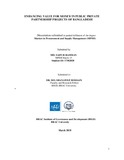| dc.contributor.advisor | Hossain, Dr. Md. Shanawez | |
| dc.contributor.author | Rahman, Md. Saifur | |
| dc.date.accessioned | 2018-06-04T04:47:06Z | |
| dc.date.available | 2018-06-04T04:47:06Z | |
| dc.date.copyright | 2018 | |
| dc.date.issued | 2018-03 | |
| dc.identifier.other | ID 17382028 | |
| dc.identifier.uri | http://hdl.handle.net/10361/10241 | |
| dc.description | This dissertation is submitted in partial fulfillment of the requirements for the degree of Masters in Procurement and Supply Management, 2018. | en_US |
| dc.description | Cataloged from PDF version of dissertation. | |
| dc.description | Includes bibliographical references (page 50-55). | |
| dc.description.abstract | With the rapid pace of civilization, Public Private Partnership (PPP) has been emerged as
a great solution for meeting the extreme demand of additional public infrastructure in
many countries across the globe. Lately, the government of Bangladesh has stepped into
PPP through issuance of Policy and Strategy for Public Private Partnership (PSPPP) 2010
and enactment of the Bangladesh Public Private Partnership Act 2015However, expected
response from the private investors was not yet received. This might be due to the fact that
the offered projects lack sufficient value to attract private investors into PPP. Hence,
identifying the significance of Value For Money (VFM) factors appears to be essential for
understanding the shortcomings of present PPP projects. This research aims to recognize
the importance of VFM factors through three main objectives. First, it attempts to sort out
the most significant VFM factors comprising the views of both public and private sectors.
Second, it intends to show the contrast the views between the public and private sector
officials. Finally, it tries to find out the necessary policy intervention from the findings of
the study those are required for preparing lucrative PPP projects for private investors. A
mixed research approach has been used for data collection of this dissertation, comprising
both interviews and questionnaire surveys. Then, Statistical Package for the Social Science
(SPSS) software has been used for data analysis of this study.
Findings reveals that top five VFM measures of PPP are, in downward order, government
involvement in providing guarantee, realistic assessment of cost/benefit, profitability to
the private sectors, government support and private management skills. The result also
indicates that both public and private parties have almost identical perception in three
fourth of the factors, through there are remarkable differences in few factors including
government support, private sector technical innovation, competitive tendering etc.
Finally, the study suggests that the best possible thing that government can do is
confirming its strong political commitment to march forward with PPP in any condition
and extend all sorts of co-operation to private sectors that required for execution of such
projects. Government also has to develop its institutional capacity to assess the
cost/benefit of offered projects in realistic way and to ensure formulation of profitable
projects to private investors. Besides, private sectors also have to put more emphasis on
developing their management skills in handling PPP projects, rather than focusing only on
making immediate profit from PPP. | en_US |
| dc.description.statementofresponsibility | Md. Saifur Rahman | |
| dc.format.extent | 55 pages | |
| dc.language.iso | en | en_US |
| dc.publisher | BRAC Univeristy | en_US |
| dc.rights | BRAC University dissertations are protected by copyright. They may be viewed from this source for any purpose, but reproduction or distribution in any format is prohibited without written permission. | |
| dc.subject | PPP | en_US |
| dc.subject | Private investment | en_US |
| dc.title | Enhancing value for money in public private partnership projects of Bangladesh | en_US |
| dc.type | Dissertation | en_US |
| dc.contributor.department | BRAC Institute of Governance and Development, BRAC University | |
| dc.description.degree | M. Procurement and Supply Management | |

